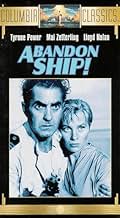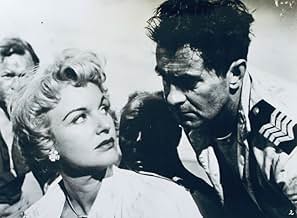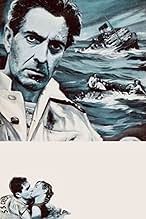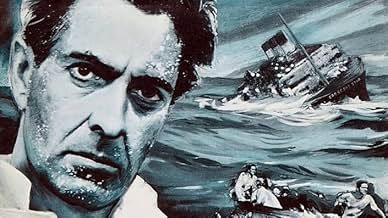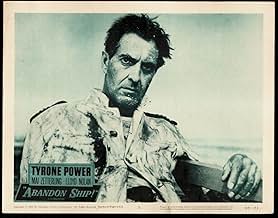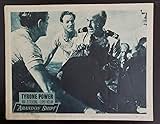Füge eine Handlung in deiner Sprache hinzuAfter hitting a derelict mine in the Atlantic Ocean, a ship's officer finds himself in command of a lifeboat full of survivors of a sunken luxury liner. The survivors fight to stay alive whi... Alles lesenAfter hitting a derelict mine in the Atlantic Ocean, a ship's officer finds himself in command of a lifeboat full of survivors of a sunken luxury liner. The survivors fight to stay alive while exposed to savage seas and each other.After hitting a derelict mine in the Atlantic Ocean, a ship's officer finds himself in command of a lifeboat full of survivors of a sunken luxury liner. The survivors fight to stay alive while exposed to savage seas and each other.
Empfohlene Bewertungen
The movie's, one and only, set is a small boat on the ocean. This happens as we are told a ship hits an old sea-mine and breaks the keel. Thus, making the ship sinks in minutes with few people surviving. We are not privy to see how the ship sank nor how the characters get into the water as the film begins after the sinking. The first bit of dialog starts as characters are already clinging to floating wreckage.
The rest of the movie all happens in the ocean. Here, Alec Holmes (Powers), will be in charge of a small boat that has way too many people aboard. Holmes makes the decision that some have to go-- and this brings us to the plot of the story.
The entire movie hinges on Power's ability to hold the audience's attention for nearly 90 minutes. Tyrone Powers accomplishes this task by giving a powerful performance. The only drawback of the movie are some of the small scenes that were overplayed for dramatic effect. It happens right at the beginning as two survivors cope with the sinking and lost of love ones. Another is when the radio operator tells that he never sent out a SOS message - and then near the end when one person wants to drown but is saved by others. Otherwise an enjoyable film to watch.
The cast performed admirably under very trying circumstances (imagine being wet all day, every day); in fact, the miseries of the filming process influenced the acting in a quasi-documentary manner that benefits the picture enormously. Even seen on television, Seven Waves Away is an intensely experiential movie; I can only imagine what it felt like on the large screen.
This was practically Tyrone Power's last hurrah; in his early forties when the movie was filmed, he died of a heart attack on a project shortly thereafter (as his actor-father Tyrone Power Sr. had before him). Power acts with tremendous force and tension as the "captain" here; the dramatic arc of the story is contained entirely within his decision-making process, and for a first-time viewer his key decision (which I will not reveal) will always register as startling because it runs so counter-intuitively to our received sense of ethics. But that is part of what gives Seven Waves Away its wallop.
They probably filmed most of this in a giant water tank but it looks like it's the open ocean. The boat always looks dangerously close to sinking and the waters get really rough. This is actually a very harrowing tale. The high stress situation is great for pulling out the characters. There is something basic about their predicament. It is primal. The story is very compelling.
True, there are a few stereotypes among the raft's passengers, but the drama becomes real and forceful due to the strong performances from an excellent cast. MAI ZETTERLING is fine as a nurse with a romantic relationship to Executive Officer Power and STEPHEN BOYD and LLOYD NOLAN are fine as other ship officers caught up in unusual circumstances surrounding their survival at sea.
Not for the squeamish, it has echoes of Hitchcock's LIFEBOAT (but without the humor).
Tyrone Power was at a stage in his career when he wanted more serious roles rather than stay forever fixed in the minds of movie-goers as a swashbuckling star. Here he certainly had his chance to prove his acting skills and he does a splendid job in a grim role, one of his last parts before his premature death from a heart attack at age 45.
Wusstest du schon
- WissenswertesThis movie is based on the real event of the William Brown, an American ship that sank in 1841, taking with her 31 passengers. A further 16 passengers were forced out of an overloaded lifeboat before the survivors were rescued. The survivors were picked up by the American ship Crescent, the same name of the liner that sinks in this movie.
- PatzerThe boat used in long shots and the one in close-ups are obviously different.
- Zitate
Announcer: [closing lines] The story which you have just seen is a true one. In real life Captain Alexander Holmes was brought to trial on a charge of murder. He was convicted and given the minimum sentence of six months because of the unusual circumstances surrounding the incident. If you had been a member of the jury, how would you have voted: guilty or innocent?
- VerbindungenRemade as The Last Survivors (1975)
Top-Auswahl
Details
- Erscheinungsdatum
- Herkunftsländer
- Sprache
- Auch bekannt als
- El mar no perdona
- Drehorte
- Shepperton Studios, Shepperton, Surrey, England, Vereinigtes Königreich(Gus Angus worked as Third Assistant Director and confirmed the film was shot on H Stage also known as the Silent Stage at Shepperton.)
- Produktionsfirma
- Weitere beteiligte Unternehmen bei IMDbPro anzeigen
- Laufzeit
- 1 Std. 40 Min.(100 min)
- Farbe
- Seitenverhältnis
- 1.85 : 1

